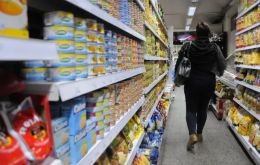MercoPress. South Atlantic News Agency
Tag: Inflation
-
Tuesday, February 10th 2026 - 21:14 UTC
Argentina: January inflation hits 2.9% and 12-month rate reaches 32.4%, INDEC says

Argentina’s inflation came in at 2.9% in January, taking the 12-month rate to 32.4%, according to the national statistics agency INDEC. The reading marked an acceleration of 0.1 percentage points from December.
Add your comment! -
Wednesday, February 4th 2026 - 02:51 UTC
Argentine shares slide in New York as country risk climbs above 500 points

Argentine stocks and hard-currency bonds fell on Tuesday, hit by a risk-off turn in global markets and fresh domestic uncertainty tied to the stalled overhaul of inflation measurement following Marco Lavagna’s departure from INDEC.
-
Tuesday, February 3rd 2026 - 12:34 UTC
Argentina’s stats chief quits as Milei’s government freezes inflation index overhaul

Argentina’s national statistics agency, INDEC, said its director, Marco Lavagna, stepped down on Monday after more than six years in the post, just as the country was preparing to launch a revamped consumer price index (CPI). Within hours, Economy Minister Luis Caputo confirmed the methodology change would be delayed indefinitely “until the disinflation process is consolidated,” with no new date set.
-
Wednesday, December 31st 2025 - 10:47 UTC
Paraguayan President highlights economic growth and 3.1% inflation

The Central Bank of Paraguay (BCP) announced on Tuesday that the country has concluded 2025 with an annual inflation rate of 3.1%, successfully meeting its target range and demonstrating a trend of continued macroeconomic stability.
-
Wednesday, November 12th 2025 - 10:55 UTC
Argentina to lift all currency exchange restrictions “soon”

While Argentina's Central Bank (BCRA) announced the “imminent” removal of all remaining controls on foreign exchange transactions, the South American country's National Institute of Statistics and Census (Indec) is about to report October's inflation on Wednesday. Most experts predict it will be above 2%.
-
Monday, November 3rd 2025 - 10:21 UTC
The Guardian highlights the hardships Argentines go through under Milei

Despite President Javier Milei's success in significantly lowering annual inflation from over 211% in 2023 to 32% by September 2025, a majority of Argentines are struggling as their purchasing power has collapsed under the administration's “chainsaw” austerity program, the London outlet The Guardian noted.
-
Tuesday, September 16th 2025 - 10:50 UTC
Uruguay: Economy grows 2.1% in 2Q of 2025

Uruguay's economy grew by 2.1% in the second quarter of 2025 compared to the same period in 2024, according to a report released on Monday by the Central Bank (BCU), which also noted a 0.4% growth from the previous quarter.
-
Thursday, September 4th 2025 - 10:16 UTC
Uruguay's inflation within target range

Uruguay's inflation, as measured by the Consumer Price Index (CPI), registered a monthly variation of -0.03% in August, the National Institute of Statistics (INE) announced on Wednesday in Montevideo.
-
Thursday, August 14th 2025 - 10:18 UTC
Argentina's inflation in July stands at 1.9%

Argentina's Consumer Price Index (CPI) rose 1.9% in July, bringing the year-on-year inflation to 36.6% and the year-to-date figure to 17.3%, according to a report from the National Institute of Statistics (Indec) released Wednesday in Buenos Aires. This marks the third consecutive month with a monthly inflation rate below 2%, a trend not seen since late 2017.
-
Wednesday, August 6th 2025 - 10:15 UTC
Uruguay's YoY inflation continues to fall

According to the National Institute of Statistics (INE) report published Tuesday in Montevideo, Uruguay's interannual inflation rate in July 2025 was 4.53%, a slight decrease from 4.59% in June. This marks the 26th consecutive month that inflation has remained within the Central Bank's target range of 3% to 6%.
